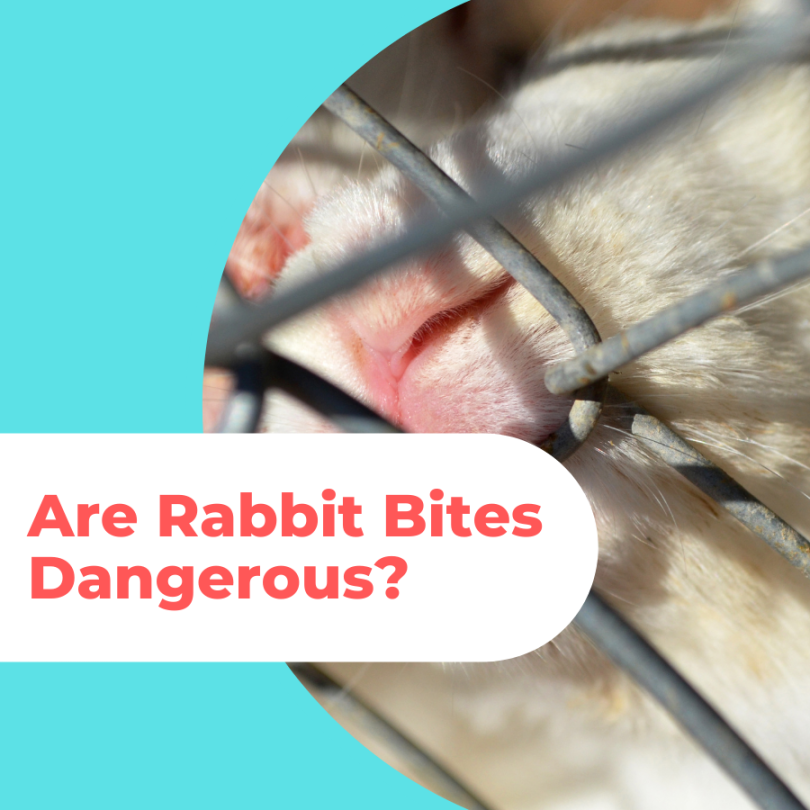Are Rabbit Bites Dangerous?
Rabbits are adorable and popular pets, known for their gentle and docile nature. However, like any animal, they may resort to biting if they feel threatened or provoked. While most rabbit bites are not dangerous, it is essential to understand the potential risks and take appropriate measures to prevent any harm. In this article, we will discuss the dangers associated with rabbit bites and how to handle them responsibly.

Why do rabbits bite?
Rabbits primarily bite as a means of self-defense. They are naturally prey animals and may become frightened or anxious if they feel cornered or scared. Biting is their way of protecting themselves or asserting dominance. Additionally, rabbits may bite if they are in pain, stressed, or feel their territory is being invaded. It is important to recognize the triggers that may lead to a rabbit bite to prevent any potential harm.
Are rabbit bites dangerous?
While rabbit bites are generally not as dangerous as those from larger animals, they can still cause injuries and complications. Rabbit bites can break the skin and may lead to bleeding or infection. The severity of a rabbit bite depends on various factors, including the size of the rabbit, the force of the bite, and the location of the bite.
Preventing rabbit bites
Prevention is key when it comes to avoiding rabbit bites. By understanding the behavior of rabbits and taking appropriate precautions, you can minimize the risk of being bitten. Here are some essential tips:
- Handle rabbits gently: Rabbits are delicate animals, and rough handling can make them feel scared or threatened. Always approach them with a calm and gentle demeanor, allowing them to sniff and become familiar with you before attempting to pick them up.
- Respect their personal space: Rabbits need their own space and may bite if they feel crowded or cornered. Avoid sudden movements or loud noises that may startle them. Provide them with a safe and comfortable enclosure where they can retreat when they feel overwhelmed.
- Supervise interactions: If you have children or other pets, it is crucial to closely supervise their interactions with rabbits. Teach children to be gentle and respectful when handling rabbits to minimize the risk of bites.
- Avoid triggering aggressive behavior: Rabbits have specific triggers that can lead to aggression and biting. Some common triggers include being touched on their sensitive areas, having their territory invaded, or being handled by unfamiliar individuals. Learn about your rabbit’s specific triggers and avoid them as much as possible.
How to treat a rabbit bite
If a rabbit bite occurs, it is important to respond promptly to minimize the risk of infection or complications. Follow these steps to treat a rabbit bite:
- Clean the wound: Wash the bite gently with mild soap and warm water to remove any dirt or bacteria. Pat the area dry with a clean towel.
- Apply an antiseptic: Apply an antiseptic solution or ointment, such as hydrogen peroxide or povidone-iodine, to the wound to prevent infection.
- Bandage the wound: If the bite is deep or bleeding heavily, apply a sterile bandage or dressing to control the bleeding and protect the wound.
- Seek medical attention: If the bite continues to bleed excessively, shows signs of infection (such as redness, swelling, or pus), or if you have concerns about tetanus, seek medical attention promptly.
Frequently Asked Questions
1. Can a rabbit bite cause Rabies?
No, rabbits are not carriers of the Rabies virus. Rabies is typically transmitted through bites from infected mammals such as raccoons, bats, or dogs. Nevertheless, it is essential to ensure your rabbit’s vaccinations are up to date, as they can contract other diseases that may require prompt medical attention.
2. Do rabbit bites hurt?
Rabbit bites can cause varying degrees of pain depending on the force of the bite and the location of the wound. However, compared to bites from larger animals, rabbit bites are generally less painful.
3. Are there any risks of infection from a rabbit bite?
Yes, there is a risk of infection from a rabbit bite. Rabbit mouths contain bacteria, and if the bite breaks the skin, it can introduce these bacteria into the wound. Proper wound care, including cleaning the wound and applying antiseptic, can significantly reduce the risk of infection.
4. Should I be worried about tetanus from a rabbit bite?
While tetanus is a concern with any bite wound, including rabbit bites, it is relatively rare. To be safe, it is advisable to keep your tetanus vaccination up to date. If you are unsure about your vaccination status or have concerns, it is best to consult a healthcare professional.
Related Articles…
Copyright Notice:
All images on this website are obtained from the internet and remain copyrighted to their original owners. If you hold copyright to any image and want it taken down, please reach us.